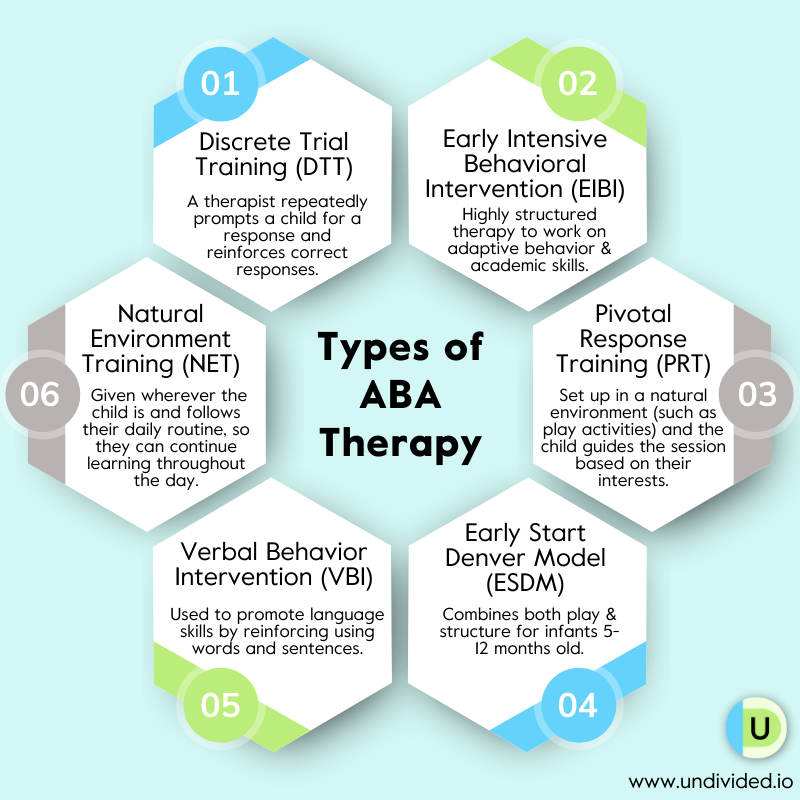Why ABA Therapy is evidence-based for skill development
Wiki Article
Recognizing the Effect of Behavior Therapy on Mental Health
Behavior treatment plays an essential function in enhancing psychological health and wellness. It utilizes structured methods to determine and alter unfavorable habits and believed patterns. By fostering self-awareness and emotional durability, people can develop much healthier coping approaches. The subtleties of its efficiency across different psychological health problems and its assimilation into day-to-day life remain complicated. Discovering these aspects discloses the profound influence Behavior Therapy can have on overall lifestyle.The Principles of Behavior Treatment
Behavior Treatment is based in the concepts of discovering theory, highlighting the function of visible behavior in mental health therapy. This method is based on the facility that actions are learned and can be unlearned or modified via ideal treatments. It concentrates on the communication in between activities, sensations, and thoughts, presuming that altering maladaptive habits can bring about improved emotional and emotional wellness.Central to this therapy is the concept of reinforcement, where positive or unfavorable stimuli affect actions adjustment. In addition, Behavior Treatment focuses on quantifiable results, aiming to track progress with evident modifications. It likewise recognizes the significance of context, advocating for an understanding of ecological factors that contribute to behavior patterns. By applying these concepts, Behavioral Treatment addresses a vast array of psychological wellness issues, making it a functional and reliable therapy choice for individuals seeking to improve their mental health and wellness through structured behavior modifications.
Typical Techniques Used in Behavior Therapy
Usual techniques utilized in Behavior Treatment play a vital role in dealing with different mental health and wellness issues. This discussion will highlight cognitive behavior strategies, direct exposure treatment techniques, and support strategies, each adding distinctly to the restorative process. Understanding these methods can improve awareness of exactly how Behavior Therapy properly advertises psychological well-being.Cognitive Behavior Methods
While different strategies exist within the domain of therapy, cognitive behavior strategies stand apart for their structured techniques targeted at addressing negative idea patterns and habits. These strategies commonly entail identifying distorted cognitions, challenging these thoughts, and replacing them with even more well balanced perspectives. Common strategies consist of cognitive restructuring, where people find out to recognize and modify their automated negative thoughts, and behavioral activation, which urges engagement in favorable activities to deal with sensations of depression. Additionally, mindfulness methods are frequently integrated to enhance awareness of thoughts and sensations without judgment. By methodically overcoming these strategies, people can create much healthier coping devices, eventually leading to boosted psychological wellness and strength versus numerous emotional challenges.Exposure Therapy Approaches
Direct exposure treatment techniques are widely recognized as effective strategies within Behavior Therapy, especially for treating anxiousness disorders, anxieties, and trauma (PTSD) These methods include gradual exposure to feared stimuli, allowing people to challenge and refine their concerns in a regulated environment. Usual methods include systematic desensitization, where people are gradually revealed to anxiety-provoking circumstances while practicing leisure techniques. One more strategy is flooding, which engages people in their fears for an extended period, often bring about quick desensitization. Online fact exposure treatment has also acquired appeal, enabling individuals to engage with virtual atmospheres that imitate their concerns. Overall, exposure treatment techniques aim to decrease evasion actions and help people create coping techniques, eventually improving psychological health and wellness and well-being.Reinforcement Approaches Explained
Reinforcement methods play a necessary role in Behavior Therapy, utilizing different strategies to motivate desired actions and lessen unwanted ones. Positive reinforcement includes awarding a habits, making it a lot more most likely to repeat. This can include verbal praise, symbols, or tangible rewards. Negative reinforcement, on the various other hand, entails removing an unpleasant stimulus when a desired habits happens, consequently increasing its regularity. Punishment techniques may likewise be utilized, where an unfavorable effect complies with an undesirable behavior to decrease its occurrence. Additionally, shaping techniques gradually reinforce better approximations to the preferred behavior. By applying these methods systematically, therapists can efficiently modify actions patterns, advertising mental health and wellness and improving general wellness for individuals seeking assistance in managing their problems.Performance of Behavior Treatment for Various Mental Health And Wellness Issues
Behavior Treatment has shown considerable efficiency in dealing with numerous mental wellness concerns, specifically stress and anxiety disorders and depression. Research suggests that individuals undertaking Behavior Therapy frequently experience notable enhancements in handling their signs and symptoms. This discussion will certainly discover the details success rates related to these therapies for stress and anxiety and clinical depression.
Stress And Anxiety Problems Treatment Efficacy
Although anxiousness disorders can substantially impair daily performance, research constantly shows the efficacy of Behavior Treatment in reducing symptoms. Numerous kinds of Behavioral Treatment, including cognitive-behavioral treatment (CBT), have actually shown considerable success in treating anxiety disorders such as generalized anxiety disorder, social stress and anxiety problem, and panic condition. These therapies focus on determining and changing adverse thought patterns and habits, furnishing people with coping techniques to manage their stress and anxiety. Research studies suggest that clients often experience a reduction in stress and anxiety degrees, boosted coping systems, and enhanced general high quality of life following treatment. Additionally, the organized nature of Behavior Treatment permits quantifiable progression, making it a recommended choice amongst mental wellness specialists for addressing anxiety-related concerns properly.Anxiety Administration Success Rates
Anxiousness conditions and depression typically co-occur, resulting in overlapping therapy approaches, specifically in the domain name of Behavior Treatment. Research shows that cognitive-behavioral therapy (CBT), a popular form of Behavioral Therapy, has demonstrated substantial Check This Out success in handling depression. Studies expose that approximately 60-70% of people getting CBT for clinical depression experience a significant reduction in signs. This effectiveness is connected to CBT's structured strategy, which equips people with coping mechanisms and cognitive restructuring strategies. Additionally, the combination of Behavior Therapy with pharmacotherapy can boost success rates, using a detailed technique for those dealing with severe anxiety. On the whole, Behavioral Therapy continues to be a critical intervention for improving mental wellness outcomes in individuals encountering depression.The Role of a Therapist in Behavior Modification

Therapists function as guides and facilitators in the method of Behavior Therapy, aiding customers navigate their obstacles via structured interventions. They use numerous methods, such as cognitive restructuring and direct exposure therapy, to assist clients in determining and changing maladaptive habits and believed patterns. By developing a non-judgmental and helpful atmosphere, therapists foster have a peek at these guys count on, which is important for effective restorative engagement.
Specialists also inform clients regarding the principles of Behavioral Therapy, enabling them to comprehend the rationale behind certain techniques. This expertise equips customers to take an energetic duty in their therapy. Additionally, specialists keep an eye on progression, changing treatments as required to ensure the most effective end results. They give responses and encouragement, reinforcing favorable modifications and assisting clients create dealing methods for future challenges. Overall, the specialist's function is essential in guiding customers toward boosted mental health and boosted well-being with structured therapeutic approaches.

Long-Term Advantages of Behavior Modification
While numerous individuals seek Behavior Treatment to resolve instant challenges, the lasting benefits prolong far past first sign alleviation. One considerable benefit is the development of dealing strategies that boost psychological resilience, enabling people to navigate future stresses more effectively - ABA Therapy. Clients often report enhanced self-awareness, which fosters a better understanding of their habits and ideas, helping with much healthier decision-making processesOn top of that, Behavioral Treatment can lead to sustained improvements in interpersonal partnerships. By learning efficient interaction and problem-solving skills, individuals might experience much deeper links with others, minimizing feelings of isolation. Additionally, many find that these restorative methods add to an aggressive approach to psychological wellness, enabling them to manage prospective problems prior to they intensify.
Eventually, the long-lasting impact of Behavioral Therapy can lead to a much more satisfying life, defined by increased emotional stability, improved relationships, and a higher sense of overall wellness.
Incorporating Behavioral Therapy Into Every Day Life
Structure on the lasting advantages of Read Full Report Behavioral Therapy, incorporating its principles into day-to-day live can further improve psychological strength and wellness. Individuals can begin by incorporating easy techniques, such as cognitive restructuring, which entails difficult unfavorable thoughts and changing them with even more positive alternatives. Developing a routine that consists of mindfulness practices, like meditation or deep breathing, can also promote understanding of behaviors and feelings.Additionally, setting attainable goals and commemorating tiny success can enhance self-efficacy and inspiration. Taking part in normal exercise not just enhances mood however additionally aids maintain the self-control found out via therapy. In addition, promoting helpful partnerships and open communication can supply crucial emotional assistance. By actively using these Behavioral Therapy strategies, people can grow a healthier attitude, navigate daily challenges better, and add to an overall improved quality of life.
Often Asked Questions

For How Long Does Behavioral Treatment Generally Last?
Behavior Therapy usually lasts from a few weeks to a number of months, depending upon specific needs and certain concerns being resolved. Procedure normally take place weekly, with progression assessments guiding the duration of the treatment.Can Behavior Modification Be Done Online?
Behavior Therapy can without a doubt be conducted online, utilizing video clip conferencing platforms. This approach provides versatility and ease of access, permitting people to engage with their specialists from the comfort of their homes, preserving therapeutic continuity.What Should I Expect in My First Session?
In the first session, customers can anticipate an initial conversation, evaluation of their worries, and establishment of treatment goals - ABA Therapy. The specialist might explain the procedure and address any type of concerns to develop a comfortable settingAre There Any Type Of Negative Effects of Behavior Therapy?
Behavioral Treatment typically has few adverse effects, but some individuals may experience short-lived pain, emotional distress, or increased stress and anxiety as they confront tough thoughts and actions. These responses normally lessen as treatment proceeds and dealing approaches establish.Exactly how Do I Discover a Qualified Behavioral Specialist?
To find a certified behavior therapist, people ought to look for recommendations from healthcare suppliers, check on the internet directory sites, and confirm qualifications. Additionally, reviewing evaluations and scheduling first appointments can aid evaluate compatibility and proficiency before deciding.Direct exposure treatment techniques are extensively identified as effective techniques within behavior therapy, specifically for dealing with stress and anxiety disorders, fears, and post-traumatic anxiety problem (PTSD) Various types of behavioral treatment, consisting of cognitive-behavioral treatment (CBT), have revealed considerable success in treating anxiousness conditions such as generalised stress and anxiety disorder, social anxiety disorder, and panic condition. Study indicates that cognitive-behavioral treatment (CBT), a popular type of behavior treatment, has actually demonstrated significant success in taking care of depression. While lots of people look for behavior treatment to attend to instant obstacles, the long-lasting benefits expand far past preliminary signs and symptom relief. Behavior therapy generally has couple of side results, but some people may experience temporary pain, emotional distress, or increased anxiety as they face challenging thoughts and behaviors.
Report this wiki page